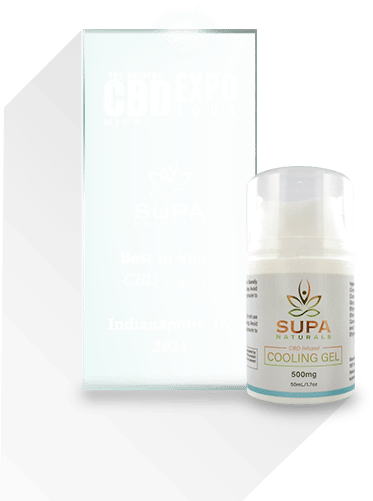How Does CBD Oil Interact With Vitamin C?
The use of CBD products has been a hot topic within the past few years. Recently, it seems like CBD products have made their way into a great deal of everyday food and personal care items. This growing popularity of CBD products makes consumers who take daily vitamins wonder whether it’s safe to mix CBD and vitamins.
The science for CBD is emerging, implying the need for more research. CBD, vitamins, and dietary supplements used simultaneously shouldn’t counteract or cause any adverse side effects in most cases. However, this may not always be the case with all supplements, especially with fake CBD oil, high doses of either, or non-regulated supplements.
For safety purposes, always check with your doctor before starting or mixing CBD with other medication or supplements. In this post, we’ll discuss CBD, how it works, and how it interacts with vitamin C. Keep reading to learn more and find out if you can take CBD with vitamins. But first, let’s start with the basics.
What Is CBD Oil?
Touted for its extensive range of health benefits, CBD (Cannabidiol) is one of the over 100 chemical compounds known as cannabinoids produced from cannabis. Preliminary findings have shown CBD to treat several ailments ranging from epileptic seizures to everyday aches and pains. CBD has also been shown to help relieve depression and anxiety.
CBD comes in a wide range of products that can be used in several ways, making it easier than ever for users to harness its positive effects. Most of these benefits boil down to CBDs’ anti-inflammatory properties. CBD has similar benefits to the more popular cannabinoid THC (Tetrahydrocannabinol) found in marijuana, without the high-inducing psychoactive effects.
CBD oil describes several products or formulas that are either concentrated or infused with CBD. In most cases, CBD oil will refer to oil containing pure CBD with no other cannabis compounds. Full-spectrum CBD oil contains more than CBD, such as cannabis-derived terpenes, flavonoids, and other cannabinoids.
CBD oil and other CBD products may contain trace amounts of THC, but not enough to produce an intoxicating effect.
What Is Vitamin C, and Why Is It Important?

Vitamin C, also called ascorbic acid, is necessary to repair damaged body tissue and form blood vessels, muscle, cartilage, and collagen in bones. Vitamin C also has potent antioxidant properties. Because your body doesn’t produce or store vitamin C for future use, you need to get it from your diet or as an oral supplement.
Most people get enough vitamin C from a healthy diet. Vitamin C deficiency is more prevalent in people who have a limited diet that doesn’t regularly include fruits and vegetables, certain gastrointestinal conditions, certain types of cancer, or smokers.
Vitamin C and Your Immune System
Perhaps triggered by the recent global pandemic, discussions about the immune system have become commonplace—and with good reason. Simply put, your body has a naturally present immune system that comprises a complex arrangement of cells, tissues, and organs.
The immune system’s primary purpose is to protect your body from being impacted by disease-causing microorganisms (such as bacteria or viruses). A healthy immune system actively protects the body by preventing harmful cells from entering and attacking the body using white blood cells.
A recent study exploring vitamin C and immune function suggests that sufficient levels of vitamin C may potentially help support a healthy immune system by:
Enhancing the potency of white blood cells
Increasing your immune system’s speed and effectiveness
Preventing the body from experiencing a high level of collateral damage caused by an immune response
Can You Take CBD and Vitamins Together?

Current research shows that CBD oil doesn’t typically interact negatively with vitamins and may even enhance some benefits. As with any supplement, users should consume both vitamins and CBD in moderate amounts under the guidance of a healthcare professional.
Since the human body cannot produce organic compounds like vitamins, some people may need supplements. Like vitamins, cannabinoids such as CBD are essential nutrients that the human body cannot produce on its own.
CBD is an essential nutrient because it’s involved in the proper function of the endocannabinoid system (ECS). Experts are still trying to understand the ECS fully. However, scientists have discovered that it regulates several body functions and processes, ranging from appetite and sleep to memory, mood, and reproduction.
CBD interacts with your body’s ECS by stimulating cannabinoid receptors. With hundreds of clinical trials in various stages of progression, research into CBD’s benefits continues to expand worldwide.
With ongoing research picking up pace fast, only a healthcare professional should recommend you take cannabidiol and multivitamins together. A potential reason for taking CBD with multivitamins is to optimize how the latter is balanced and distributed throughout the body. CBD and multivitamins can provide essential nutrients for those lacking a well-balanced diet.
Some benefits of taking CBD oil together with multivitamins include fluidifying the digestive tract and acting as enzymes in stimulating biological reactions. Obviously, CBD and multivitamins do not substitute a balanced diet; instead, they reinforce a proper diet. Overall, taking CBD oil and multivitamins seems to have very distinct benefits that attract those searching for holistic health improvement.
Can You Take CBD Oil With Vitamin C?
Depending on the carrier oil or other ingredients used in CBD products, CBD oil may contain vitamin C. That said, a report found no interactions between CBD and Vitamin C. Since hemp seed oil is a popular carrier oil, it should be safe for those who can take Vitamin C in the form of hemp oil.
If you aim to take CBD oil and get your vitamin C by eating citrus fruit, you could benefit from various desirable benefits. Citrus fruits such as oranges, lemons, limes, grapefruit, and more contain high levels of vitamin C. However, you may have to exercise caution when eating grapefruit with CBD.
Grapefruit has a bit of a history of inhibiting certain enzymes that can alter your body’s interaction with compounds such as CBD. For instance, it may increase the potency of CBD and or slow down the processing of CBD. This interaction between grapefruit and CBD may not necessarily be a bad thing. However, you may have to alter your current dosage.
Taking grapefruit together with CBD may also increase the mild side effects of CBD. While the interaction between grapefruit and CBD is not caused by the vitamins contained in the fruit, it’s something you should know and consider before taking CBD with any other citrus fruits or medication.
Again, before self-administering any substance, even CBD isolate, don’t hesitate to seek advice from a certified physician.
Benefits of Mixing CBD With Vitamin C
Vitamin C and CBD are great companions. The former speeds up your body’s capacity to absorb cannabidiol, further enhancing the effect. Therefore, a combination of vitamin C and CBD protects you from free radicals and strengthens your immune system, vascular system, skin, and bones. And since your body can’t produce its own vitamin C, a combination of CBD and vitamin C makes for a sensible combination.
Where To Buy CBD Oil and CBD Products
As mentioned earlier, the quality of CBD you consume matters. With the proliferation of CBD in the past few years, you want to make sure you’re purchasing products from a reputable seller. CBD is easily accessible online and in walk-in stores. Most retailers like SUPA Naturals stock only high-quality, safe, and potent CBD products.
Here are a few tips to consider when purchasing a CBD product.
Ask for Test Results
A certificate of analysis, or COA, is a quality control measure that confirms whether the product contains the quantities of CBD that the manufacturer advertises or claims. It also lists any possible contamination from chemicals or heavy metals. A COA should come from an independent source and not the manufacturer or brand to ensure accurate and unbiased results.
Find Out the Source of the Hemp
Since CBD oil primarily comes from the hemp plant, be sure to check labels to see whether the retailer says where and how the hemp was grown. That’s crucial because the highest quality CBD oil comes from organically grown hemp plants. That means the farmers don’t use any artificial fertilizers, pesticides, or other synthetic additions.
You also want to choose locally grown hemp because products made with hemp grown overseas may not be subject to any state or federal testing. For online products, check the companies’ websites for that information. Alternatively, you can contact the seller to give details about the source of their hemp.
Choose CO2 Extracted CBD
The CO2 extraction process ensures purity, which is why it’s so crucial for CBD products. The CBD oil produced by CO2 extraction retains its potency without being contaminated by toxic substances. If you’re looking for some of the purest CBD products on the market, CO2 extraction is only a few steps from being a complete isolate, which makes it the best way to go.
Go for Full-Spectrum CBD Oil
Full-spectrum CBD oil contains many cannabinoids beyond only CBD. It may include trace amounts of THC (up to 0.3%) and other hemp plant elements such as terpenes, fatty acids, essential vitamins, protein, and more. These additional compounds help your body process the CBD more efficiently.
A recent study notes there’s some evidence for the “entourage effect,” which hypothesizes that the presence of multiple compounds from the cannabis plant maximizes its health benefits. So, when purchasing CBD products, you might want to consider selecting full-spectrum CBD oil as it contains some of these other beneficial compounds.
Avoid companies that make extravagant CBD claims. An obvious and crucial step is to avoid brands promising to heal cancer, epilepsy, or other diseases in record time. CBD has plenty of benefits and holds much promise, but more research is needed. A brand’s excessive claims are a tell-tale sign that they’re looking to take advantage of uninformed consumers.
Also, it’s wise to check the product label. Because of CBD’s complex legal status, many CBD products on the market have misleading labels. Be careful if the label only mentions cannabinoids in general rather than CBD. Hemp has hundreds of cannabinoids. And since CBD is the most beneficial, any CBD product should indicate how much CBD it contains.
It’s also helpful to know what other terms on the label may mean. Some CBD retailers describe their products as coming from or including hemp oil. In some cases, they may use the term “hemp oil” to mean CBD oil. However, hemp oil comes from the seeds of the hemp plant rather than the flowers and contains minimal amounts of CBD.
Final Thoughts

The bottom line is always to consult a healthcare professional if you’d like to try CBD. That is especially the case if you’re taking medications/supplements or have a health condition. Unless you have the go-ahead from your doctor, never stop taking your prescription medications and replace them with CBD.
Medications that come with a grapefruit warning will likely interact with CBD oil. However, your doctor may be able to formulate a plan that works for you through close monitoring of the medication levels in your system. That way, you can complement your treatment therapy with CBD oil.
When shopping for CBD oil, choose a product with a COA that’s been tested by a third-party laboratory. That’s the best way to know the compounds the product contains and whether or not it’s safe for use.
At SUPA Naturals, we use superficial CO2 extraction to produce high-quality CBD products from organically grown hemp plants. That means our products contain no solvent residues, toxins, artificial filters, heavy metals, or pesticides. We ensure the consistency of our products with third-party lab reports.
Are you ready to enjoy the benefits of some of the highest quality CBD products on the market? Check out our SUPA Naturals store to find the right products for your needs. You can also try our CBD quiz to see what may work for you. We stock only the most effective and premium CBD products.






